An Analysis of Tesco's Employee Behavior Using Social Cognitive Theory
VerifiedAdded on 2023/01/04
|7
|1779
|99
Report
AI Summary
This report analyzes Tesco's employee behavior through the framework of social cognitive theory (SCT), examining the interplay between personal, environmental, and behavioral factors. The report applies SCT's key determinants, including reciprocal determinism, behavioral capability, observational learning, reinforcement, expectations, and self-efficacy, to understand employee actions within Tesco. It explores how changes in the retail environment, such as the shift to convenience stores and increased competition, impact employee behavior and customer interactions. The report discusses how Tesco can leverage SCT to improve customer service, manage employee performance, and maintain a competitive advantage in the marketplace. It highlights the importance of training, motivation, and addressing issues like discrimination to foster a positive work environment and enhance customer satisfaction, ultimately aiming to improve company profits and sustainability.
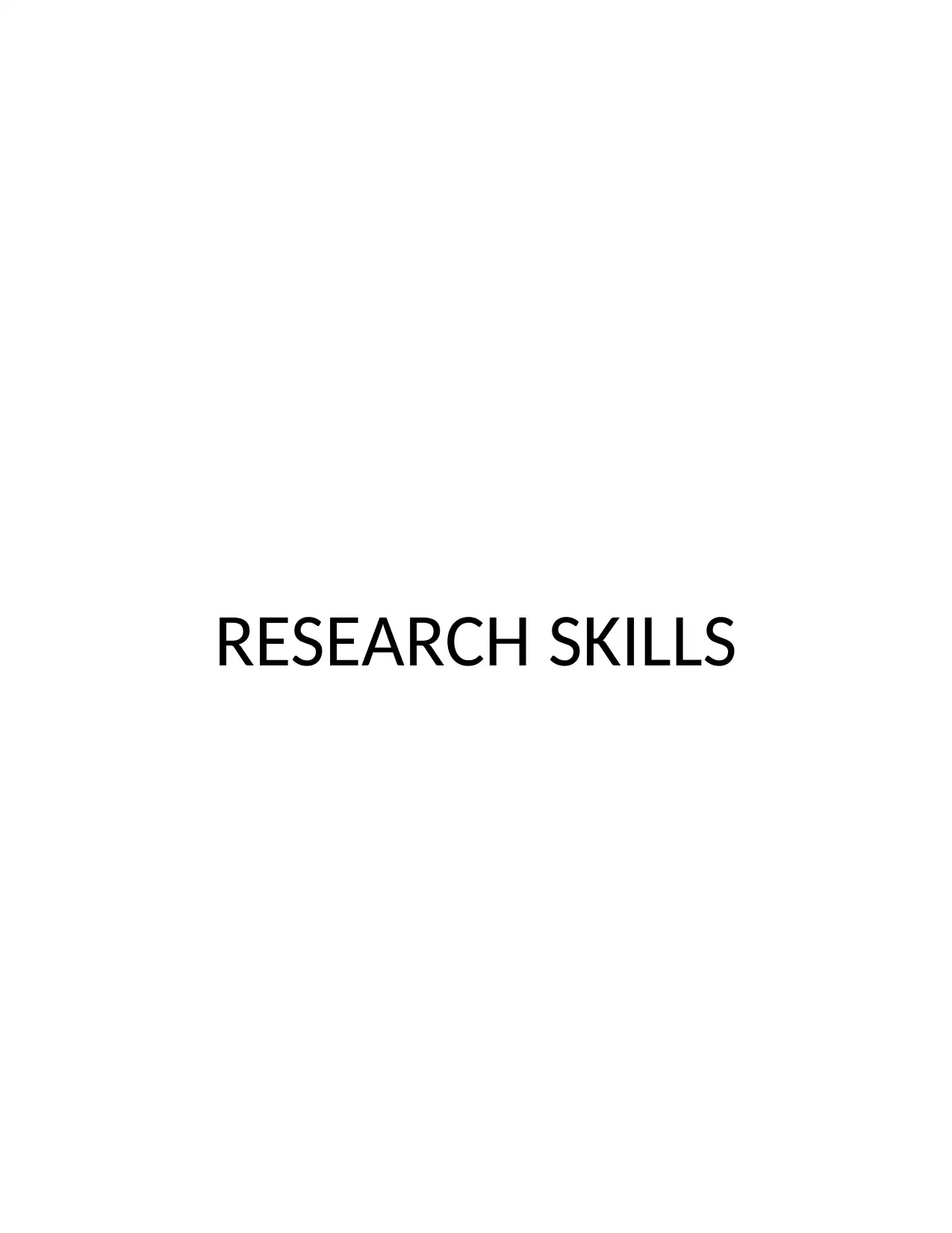
RESEARCH SKILLS
Paraphrase This Document
Need a fresh take? Get an instant paraphrase of this document with our AI Paraphraser
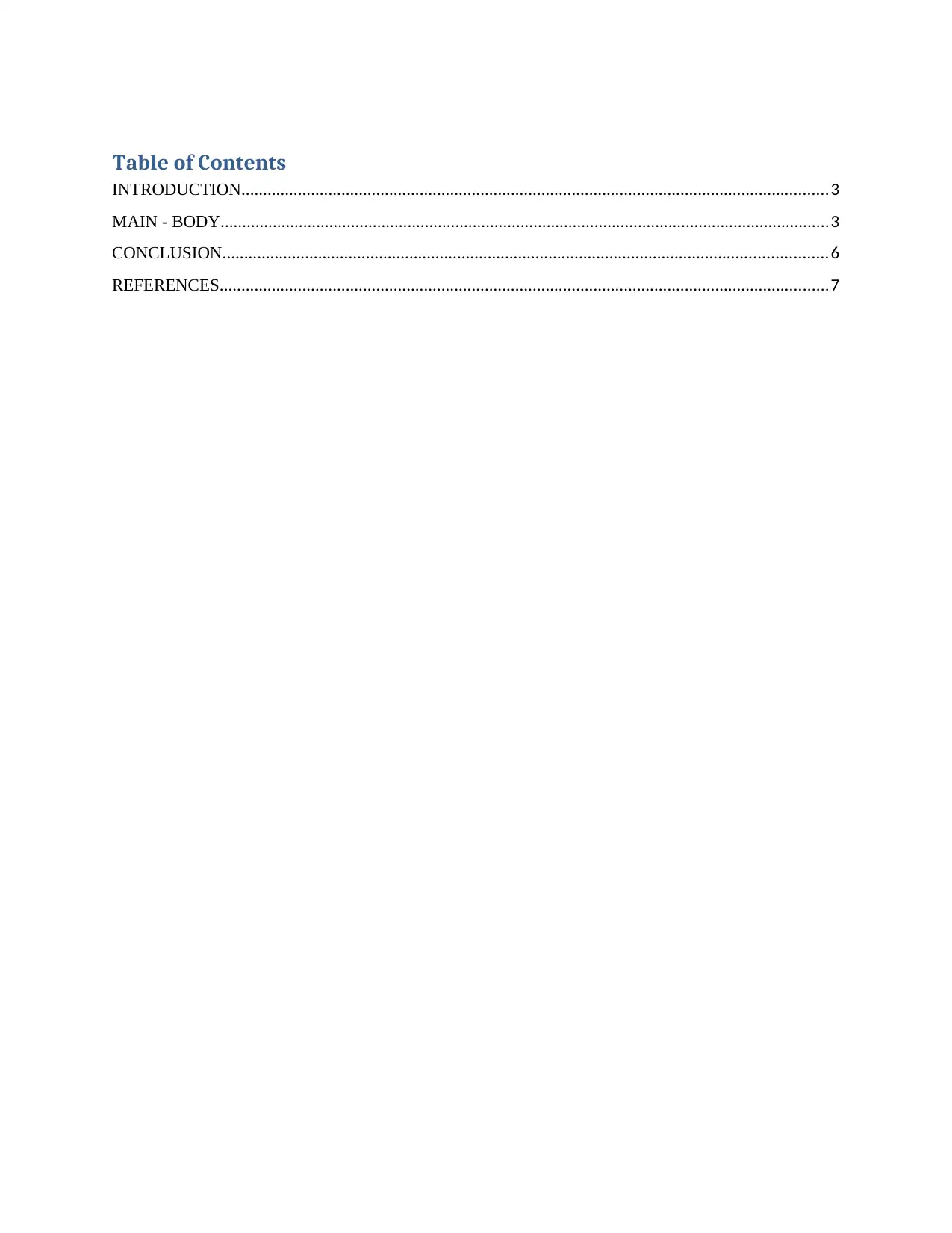
Table of Contents
INTRODUCTION.......................................................................................................................................3
MAIN - BODY............................................................................................................................................3
CONCLUSION...........................................................................................................................................6
REFERENCES............................................................................................................................................7
INTRODUCTION.......................................................................................................................................3
MAIN - BODY............................................................................................................................................3
CONCLUSION...........................................................................................................................................6
REFERENCES............................................................................................................................................7
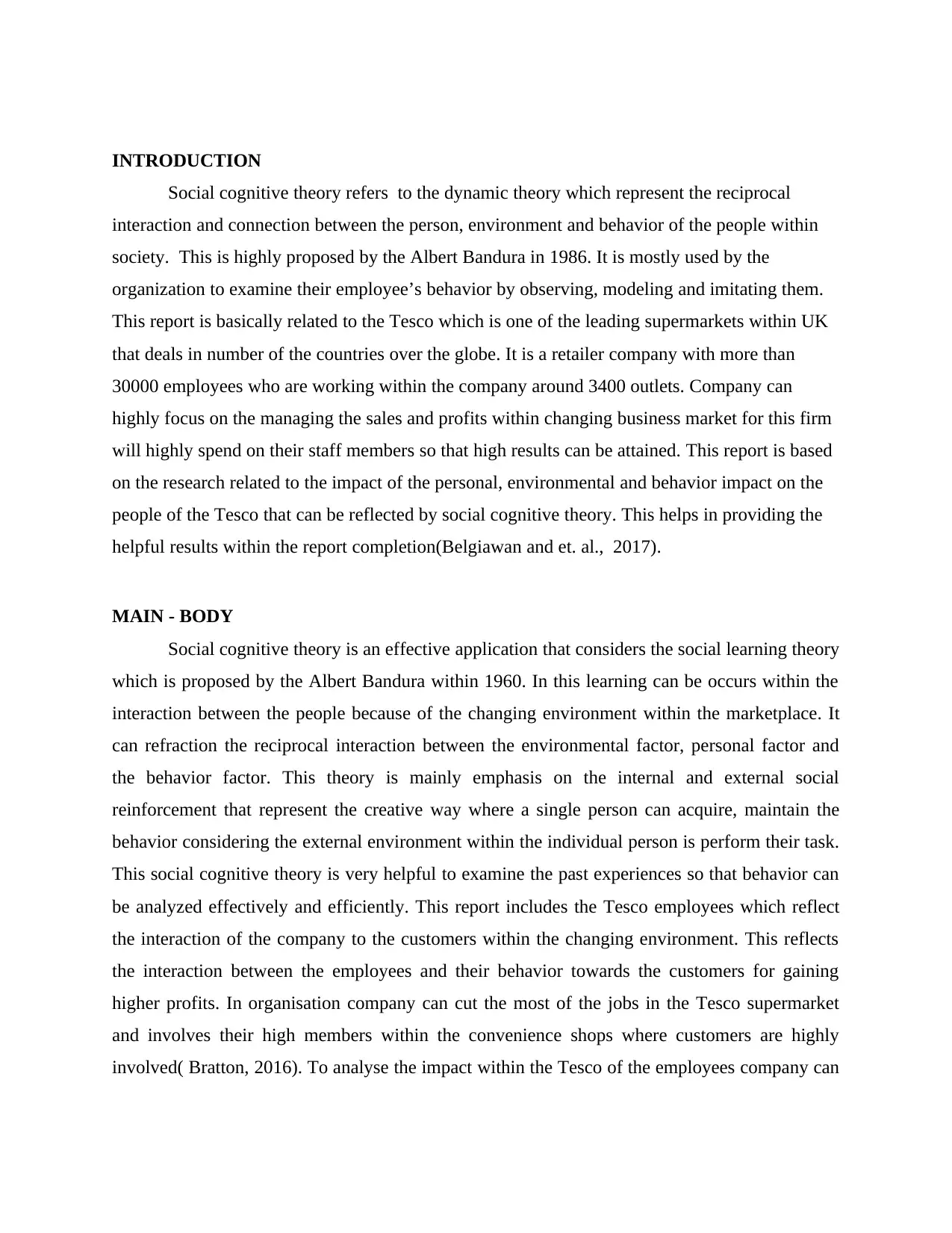
INTRODUCTION
Social cognitive theory refers to the dynamic theory which represent the reciprocal
interaction and connection between the person, environment and behavior of the people within
society. This is highly proposed by the Albert Bandura in 1986. It is mostly used by the
organization to examine their employee’s behavior by observing, modeling and imitating them.
This report is basically related to the Tesco which is one of the leading supermarkets within UK
that deals in number of the countries over the globe. It is a retailer company with more than
30000 employees who are working within the company around 3400 outlets. Company can
highly focus on the managing the sales and profits within changing business market for this firm
will highly spend on their staff members so that high results can be attained. This report is based
on the research related to the impact of the personal, environmental and behavior impact on the
people of the Tesco that can be reflected by social cognitive theory. This helps in providing the
helpful results within the report completion(Belgiawan and et. al., 2017).
MAIN - BODY
Social cognitive theory is an effective application that considers the social learning theory
which is proposed by the Albert Bandura within 1960. In this learning can be occurs within the
interaction between the people because of the changing environment within the marketplace. It
can refraction the reciprocal interaction between the environmental factor, personal factor and
the behavior factor. This theory is mainly emphasis on the internal and external social
reinforcement that represent the creative way where a single person can acquire, maintain the
behavior considering the external environment within the individual person is perform their task.
This social cognitive theory is very helpful to examine the past experiences so that behavior can
be analyzed effectively and efficiently. This report includes the Tesco employees which reflect
the interaction of the company to the customers within the changing environment. This reflects
the interaction between the employees and their behavior towards the customers for gaining
higher profits. In organisation company can cut the most of the jobs in the Tesco supermarket
and involves their high members within the convenience shops where customers are highly
involved( Bratton, 2016). To analyse the impact within the Tesco of the employees company can
Social cognitive theory refers to the dynamic theory which represent the reciprocal
interaction and connection between the person, environment and behavior of the people within
society. This is highly proposed by the Albert Bandura in 1986. It is mostly used by the
organization to examine their employee’s behavior by observing, modeling and imitating them.
This report is basically related to the Tesco which is one of the leading supermarkets within UK
that deals in number of the countries over the globe. It is a retailer company with more than
30000 employees who are working within the company around 3400 outlets. Company can
highly focus on the managing the sales and profits within changing business market for this firm
will highly spend on their staff members so that high results can be attained. This report is based
on the research related to the impact of the personal, environmental and behavior impact on the
people of the Tesco that can be reflected by social cognitive theory. This helps in providing the
helpful results within the report completion(Belgiawan and et. al., 2017).
MAIN - BODY
Social cognitive theory is an effective application that considers the social learning theory
which is proposed by the Albert Bandura within 1960. In this learning can be occurs within the
interaction between the people because of the changing environment within the marketplace. It
can refraction the reciprocal interaction between the environmental factor, personal factor and
the behavior factor. This theory is mainly emphasis on the internal and external social
reinforcement that represent the creative way where a single person can acquire, maintain the
behavior considering the external environment within the individual person is perform their task.
This social cognitive theory is very helpful to examine the past experiences so that behavior can
be analyzed effectively and efficiently. This report includes the Tesco employees which reflect
the interaction of the company to the customers within the changing environment. This reflects
the interaction between the employees and their behavior towards the customers for gaining
higher profits. In organisation company can cut the most of the jobs in the Tesco supermarket
and involves their high members within the convenience shops where customers are highly
involved( Bratton, 2016). To analyse the impact within the Tesco of the employees company can
⊘ This is a preview!⊘
Do you want full access?
Subscribe today to unlock all pages.

Trusted by 1+ million students worldwide
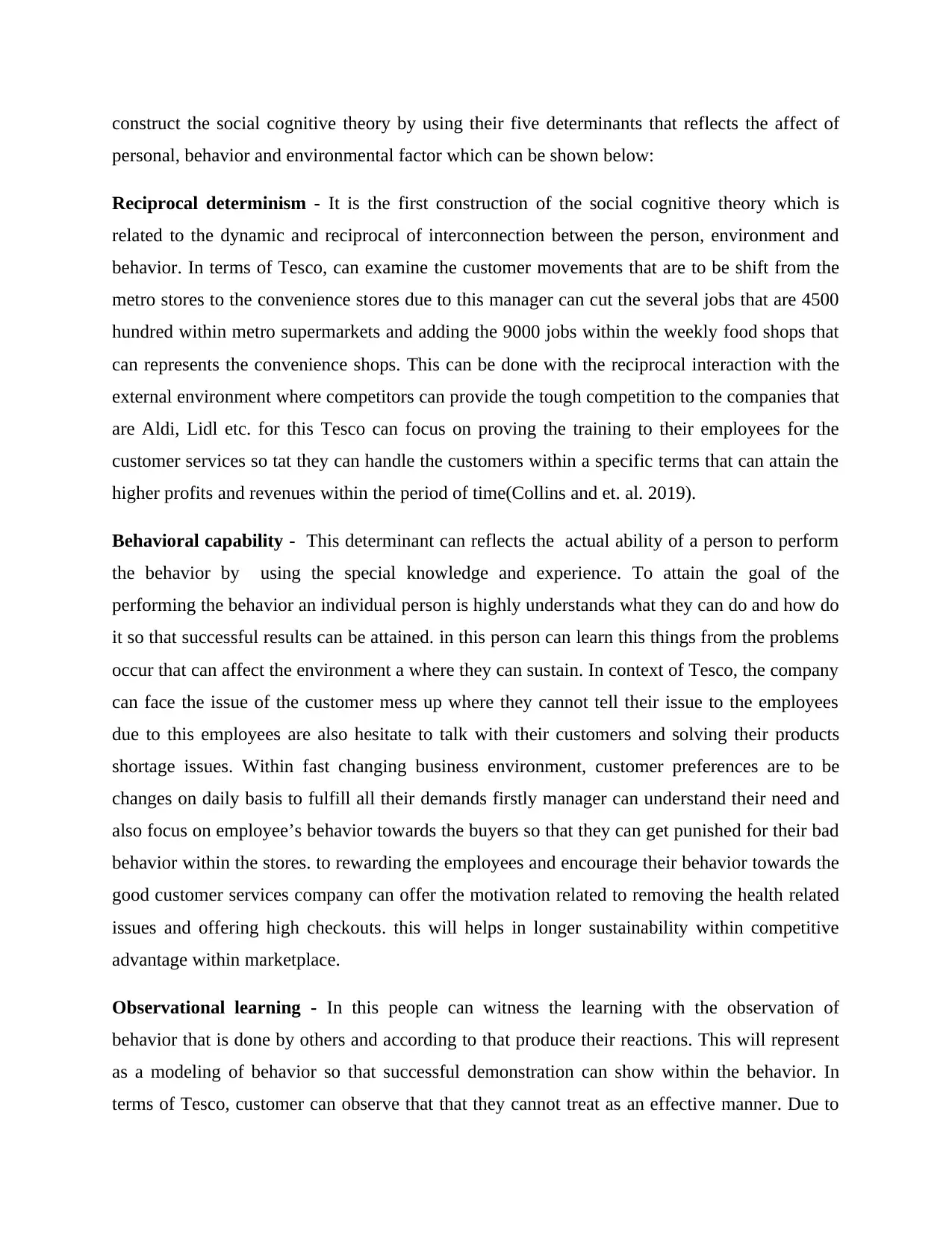
construct the social cognitive theory by using their five determinants that reflects the affect of
personal, behavior and environmental factor which can be shown below:
Reciprocal determinism - It is the first construction of the social cognitive theory which is
related to the dynamic and reciprocal of interconnection between the person, environment and
behavior. In terms of Tesco, can examine the customer movements that are to be shift from the
metro stores to the convenience stores due to this manager can cut the several jobs that are 4500
hundred within metro supermarkets and adding the 9000 jobs within the weekly food shops that
can represents the convenience shops. This can be done with the reciprocal interaction with the
external environment where competitors can provide the tough competition to the companies that
are Aldi, Lidl etc. for this Tesco can focus on proving the training to their employees for the
customer services so tat they can handle the customers within a specific terms that can attain the
higher profits and revenues within the period of time(Collins and et. al. 2019).
Behavioral capability - This determinant can reflects the actual ability of a person to perform
the behavior by using the special knowledge and experience. To attain the goal of the
performing the behavior an individual person is highly understands what they can do and how do
it so that successful results can be attained. in this person can learn this things from the problems
occur that can affect the environment a where they can sustain. In context of Tesco, the company
can face the issue of the customer mess up where they cannot tell their issue to the employees
due to this employees are also hesitate to talk with their customers and solving their products
shortage issues. Within fast changing business environment, customer preferences are to be
changes on daily basis to fulfill all their demands firstly manager can understand their need and
also focus on employee’s behavior towards the buyers so that they can get punished for their bad
behavior within the stores. to rewarding the employees and encourage their behavior towards the
good customer services company can offer the motivation related to removing the health related
issues and offering high checkouts. this will helps in longer sustainability within competitive
advantage within marketplace.
Observational learning - In this people can witness the learning with the observation of
behavior that is done by others and according to that produce their reactions. This will represent
as a modeling of behavior so that successful demonstration can show within the behavior. In
terms of Tesco, customer can observe that that they cannot treat as an effective manner. Due to
personal, behavior and environmental factor which can be shown below:
Reciprocal determinism - It is the first construction of the social cognitive theory which is
related to the dynamic and reciprocal of interconnection between the person, environment and
behavior. In terms of Tesco, can examine the customer movements that are to be shift from the
metro stores to the convenience stores due to this manager can cut the several jobs that are 4500
hundred within metro supermarkets and adding the 9000 jobs within the weekly food shops that
can represents the convenience shops. This can be done with the reciprocal interaction with the
external environment where competitors can provide the tough competition to the companies that
are Aldi, Lidl etc. for this Tesco can focus on proving the training to their employees for the
customer services so tat they can handle the customers within a specific terms that can attain the
higher profits and revenues within the period of time(Collins and et. al. 2019).
Behavioral capability - This determinant can reflects the actual ability of a person to perform
the behavior by using the special knowledge and experience. To attain the goal of the
performing the behavior an individual person is highly understands what they can do and how do
it so that successful results can be attained. in this person can learn this things from the problems
occur that can affect the environment a where they can sustain. In context of Tesco, the company
can face the issue of the customer mess up where they cannot tell their issue to the employees
due to this employees are also hesitate to talk with their customers and solving their products
shortage issues. Within fast changing business environment, customer preferences are to be
changes on daily basis to fulfill all their demands firstly manager can understand their need and
also focus on employee’s behavior towards the buyers so that they can get punished for their bad
behavior within the stores. to rewarding the employees and encourage their behavior towards the
good customer services company can offer the motivation related to removing the health related
issues and offering high checkouts. this will helps in longer sustainability within competitive
advantage within marketplace.
Observational learning - In this people can witness the learning with the observation of
behavior that is done by others and according to that produce their reactions. This will represent
as a modeling of behavior so that successful demonstration can show within the behavior. In
terms of Tesco, customer can observe that that they cannot treat as an effective manner. Due to
Paraphrase This Document
Need a fresh take? Get an instant paraphrase of this document with our AI Paraphraser
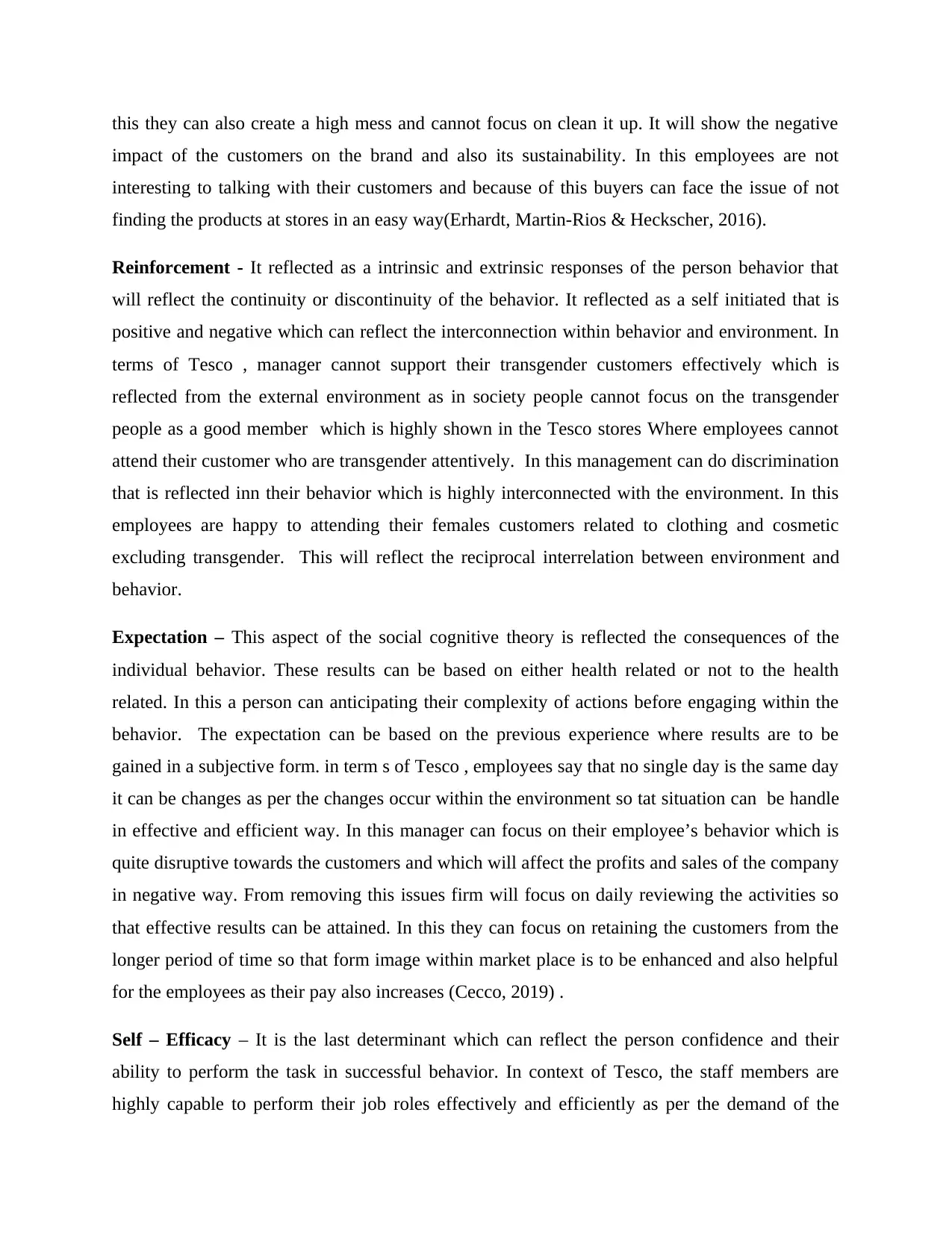
this they can also create a high mess and cannot focus on clean it up. It will show the negative
impact of the customers on the brand and also its sustainability. In this employees are not
interesting to talking with their customers and because of this buyers can face the issue of not
finding the products at stores in an easy way(Erhardt, Martin-Rios & Heckscher, 2016).
Reinforcement - It reflected as a intrinsic and extrinsic responses of the person behavior that
will reflect the continuity or discontinuity of the behavior. It reflected as a self initiated that is
positive and negative which can reflect the interconnection within behavior and environment. In
terms of Tesco , manager cannot support their transgender customers effectively which is
reflected from the external environment as in society people cannot focus on the transgender
people as a good member which is highly shown in the Tesco stores Where employees cannot
attend their customer who are transgender attentively. In this management can do discrimination
that is reflected inn their behavior which is highly interconnected with the environment. In this
employees are happy to attending their females customers related to clothing and cosmetic
excluding transgender. This will reflect the reciprocal interrelation between environment and
behavior.
Expectation – This aspect of the social cognitive theory is reflected the consequences of the
individual behavior. These results can be based on either health related or not to the health
related. In this a person can anticipating their complexity of actions before engaging within the
behavior. The expectation can be based on the previous experience where results are to be
gained in a subjective form. in term s of Tesco , employees say that no single day is the same day
it can be changes as per the changes occur within the environment so tat situation can be handle
in effective and efficient way. In this manager can focus on their employee’s behavior which is
quite disruptive towards the customers and which will affect the profits and sales of the company
in negative way. From removing this issues firm will focus on daily reviewing the activities so
that effective results can be attained. In this they can focus on retaining the customers from the
longer period of time so that form image within market place is to be enhanced and also helpful
for the employees as their pay also increases (Cecco, 2019) .
Self – Efficacy – It is the last determinant which can reflect the person confidence and their
ability to perform the task in successful behavior. In context of Tesco, the staff members are
highly capable to perform their job roles effectively and efficiently as per the demand of the
impact of the customers on the brand and also its sustainability. In this employees are not
interesting to talking with their customers and because of this buyers can face the issue of not
finding the products at stores in an easy way(Erhardt, Martin-Rios & Heckscher, 2016).
Reinforcement - It reflected as a intrinsic and extrinsic responses of the person behavior that
will reflect the continuity or discontinuity of the behavior. It reflected as a self initiated that is
positive and negative which can reflect the interconnection within behavior and environment. In
terms of Tesco , manager cannot support their transgender customers effectively which is
reflected from the external environment as in society people cannot focus on the transgender
people as a good member which is highly shown in the Tesco stores Where employees cannot
attend their customer who are transgender attentively. In this management can do discrimination
that is reflected inn their behavior which is highly interconnected with the environment. In this
employees are happy to attending their females customers related to clothing and cosmetic
excluding transgender. This will reflect the reciprocal interrelation between environment and
behavior.
Expectation – This aspect of the social cognitive theory is reflected the consequences of the
individual behavior. These results can be based on either health related or not to the health
related. In this a person can anticipating their complexity of actions before engaging within the
behavior. The expectation can be based on the previous experience where results are to be
gained in a subjective form. in term s of Tesco , employees say that no single day is the same day
it can be changes as per the changes occur within the environment so tat situation can be handle
in effective and efficient way. In this manager can focus on their employee’s behavior which is
quite disruptive towards the customers and which will affect the profits and sales of the company
in negative way. From removing this issues firm will focus on daily reviewing the activities so
that effective results can be attained. In this they can focus on retaining the customers from the
longer period of time so that form image within market place is to be enhanced and also helpful
for the employees as their pay also increases (Cecco, 2019) .
Self – Efficacy – It is the last determinant which can reflect the person confidence and their
ability to perform the task in successful behavior. In context of Tesco, the staff members are
highly capable to perform their job roles effectively and efficiently as per the demand of the
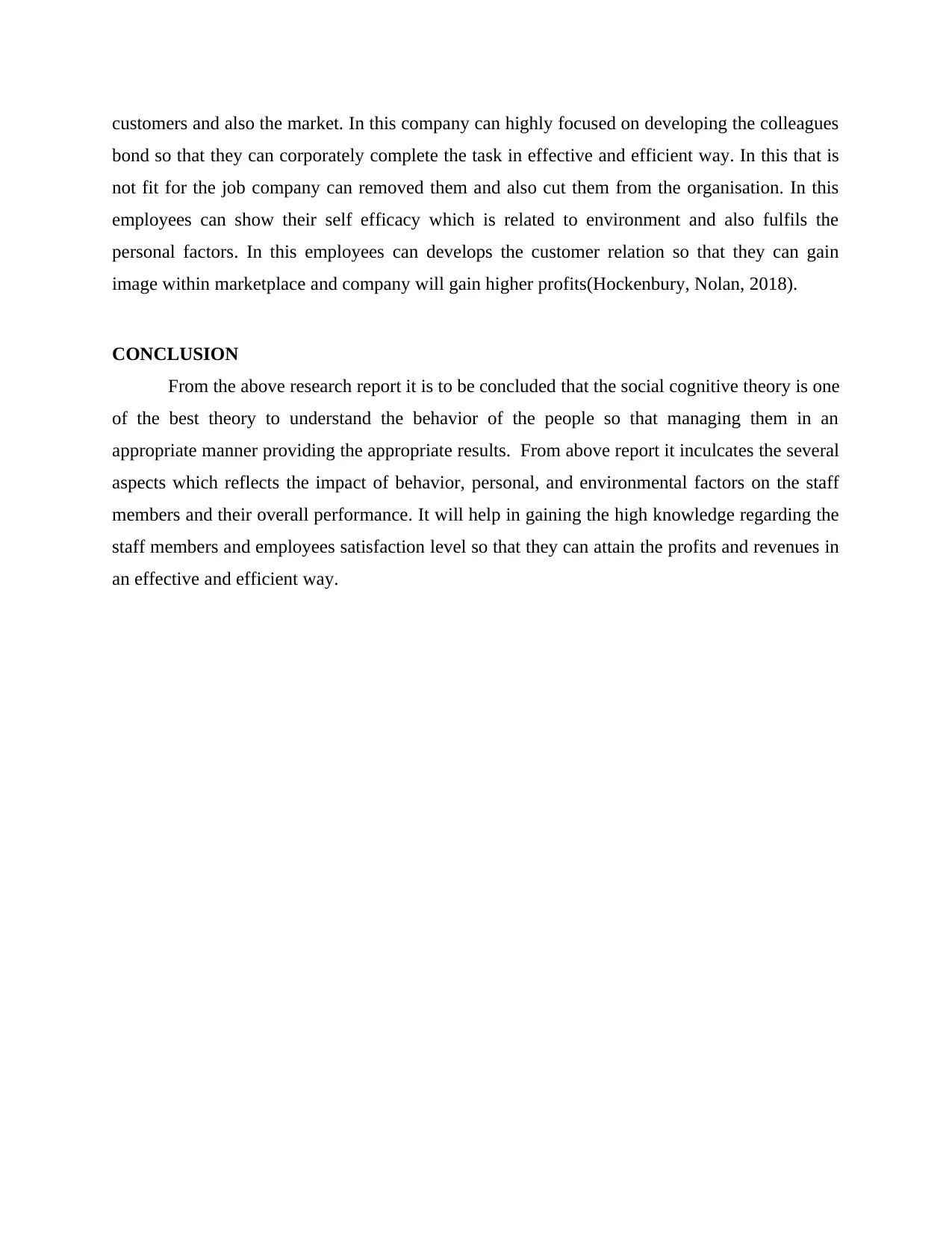
customers and also the market. In this company can highly focused on developing the colleagues
bond so that they can corporately complete the task in effective and efficient way. In this that is
not fit for the job company can removed them and also cut them from the organisation. In this
employees can show their self efficacy which is related to environment and also fulfils the
personal factors. In this employees can develops the customer relation so that they can gain
image within marketplace and company will gain higher profits(Hockenbury, Nolan, 2018).
CONCLUSION
From the above research report it is to be concluded that the social cognitive theory is one
of the best theory to understand the behavior of the people so that managing them in an
appropriate manner providing the appropriate results. From above report it inculcates the several
aspects which reflects the impact of behavior, personal, and environmental factors on the staff
members and their overall performance. It will help in gaining the high knowledge regarding the
staff members and employees satisfaction level so that they can attain the profits and revenues in
an effective and efficient way.
bond so that they can corporately complete the task in effective and efficient way. In this that is
not fit for the job company can removed them and also cut them from the organisation. In this
employees can show their self efficacy which is related to environment and also fulfils the
personal factors. In this employees can develops the customer relation so that they can gain
image within marketplace and company will gain higher profits(Hockenbury, Nolan, 2018).
CONCLUSION
From the above research report it is to be concluded that the social cognitive theory is one
of the best theory to understand the behavior of the people so that managing them in an
appropriate manner providing the appropriate results. From above report it inculcates the several
aspects which reflects the impact of behavior, personal, and environmental factors on the staff
members and their overall performance. It will help in gaining the high knowledge regarding the
staff members and employees satisfaction level so that they can attain the profits and revenues in
an effective and efficient way.
⊘ This is a preview!⊘
Do you want full access?
Subscribe today to unlock all pages.

Trusted by 1+ million students worldwide
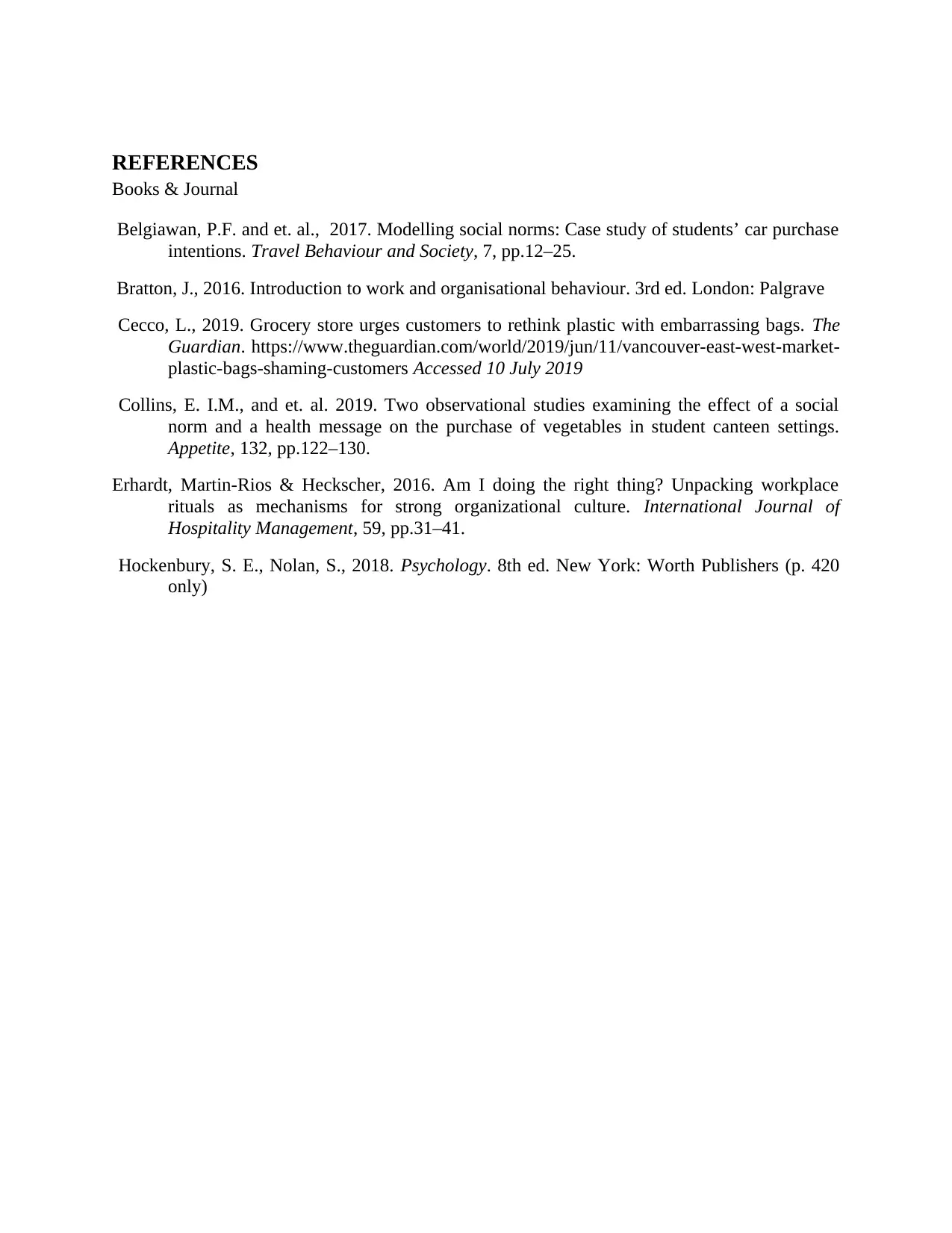
REFERENCES
Books & Journal
Belgiawan, P.F. and et. al., 2017. Modelling social norms: Case study of students’ car purchase
intentions. Travel Behaviour and Society, 7, pp.12–25.
Bratton, J., 2016. Introduction to work and organisational behaviour. 3rd ed. London: Palgrave
Cecco, L., 2019. Grocery store urges customers to rethink plastic with embarrassing bags. The
Guardian. https://www.theguardian.com/world/2019/jun/11/vancouver-east-west-market-
plastic-bags-shaming-customers Accessed 10 July 2019
Collins, E. I.M., and et. al. 2019. Two observational studies examining the effect of a social
norm and a health message on the purchase of vegetables in student canteen settings.
Appetite, 132, pp.122–130.
Erhardt, Martin-Rios & Heckscher, 2016. Am I doing the right thing? Unpacking workplace
rituals as mechanisms for strong organizational culture. International Journal of
Hospitality Management, 59, pp.31–41.
Hockenbury, S. E., Nolan, S., 2018. Psychology. 8th ed. New York: Worth Publishers (p. 420
only)
Books & Journal
Belgiawan, P.F. and et. al., 2017. Modelling social norms: Case study of students’ car purchase
intentions. Travel Behaviour and Society, 7, pp.12–25.
Bratton, J., 2016. Introduction to work and organisational behaviour. 3rd ed. London: Palgrave
Cecco, L., 2019. Grocery store urges customers to rethink plastic with embarrassing bags. The
Guardian. https://www.theguardian.com/world/2019/jun/11/vancouver-east-west-market-
plastic-bags-shaming-customers Accessed 10 July 2019
Collins, E. I.M., and et. al. 2019. Two observational studies examining the effect of a social
norm and a health message on the purchase of vegetables in student canteen settings.
Appetite, 132, pp.122–130.
Erhardt, Martin-Rios & Heckscher, 2016. Am I doing the right thing? Unpacking workplace
rituals as mechanisms for strong organizational culture. International Journal of
Hospitality Management, 59, pp.31–41.
Hockenbury, S. E., Nolan, S., 2018. Psychology. 8th ed. New York: Worth Publishers (p. 420
only)
1 out of 7
Related Documents
Your All-in-One AI-Powered Toolkit for Academic Success.
+13062052269
info@desklib.com
Available 24*7 on WhatsApp / Email
![[object Object]](/_next/static/media/star-bottom.7253800d.svg)
Unlock your academic potential
Copyright © 2020–2026 A2Z Services. All Rights Reserved. Developed and managed by ZUCOL.





